Table of Contents
Toggle

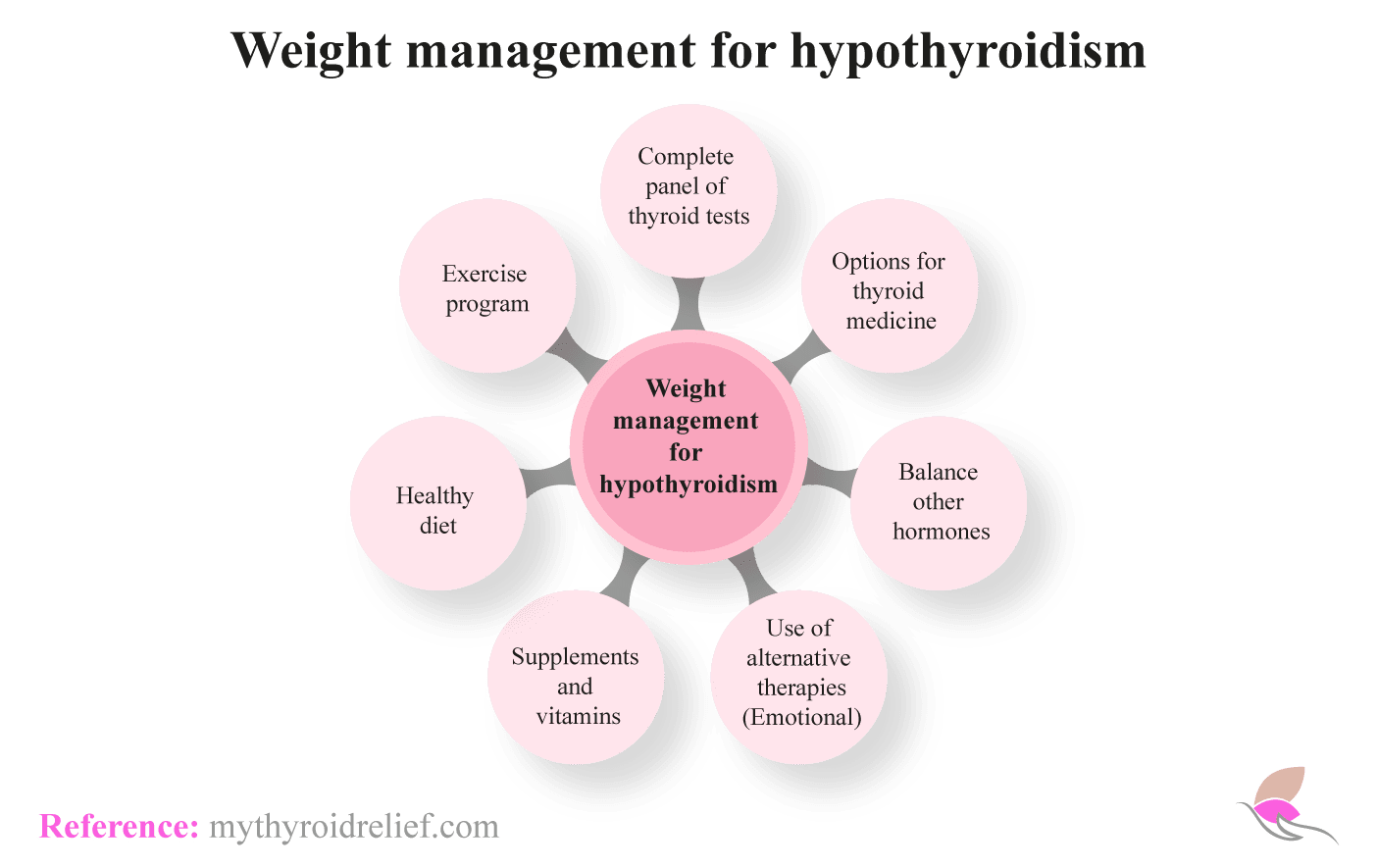

Did You know that Thyroid Health and Weight Gain are Connected?
The Importance of Thyroid Regarding Metabolism and Weight.
The thyroid is a small gland in the front of your neck. It releases two hormones, T3 and T4 that regulate your metabolism. Physicians call the thyroid hormones the master regulators of metabolism.
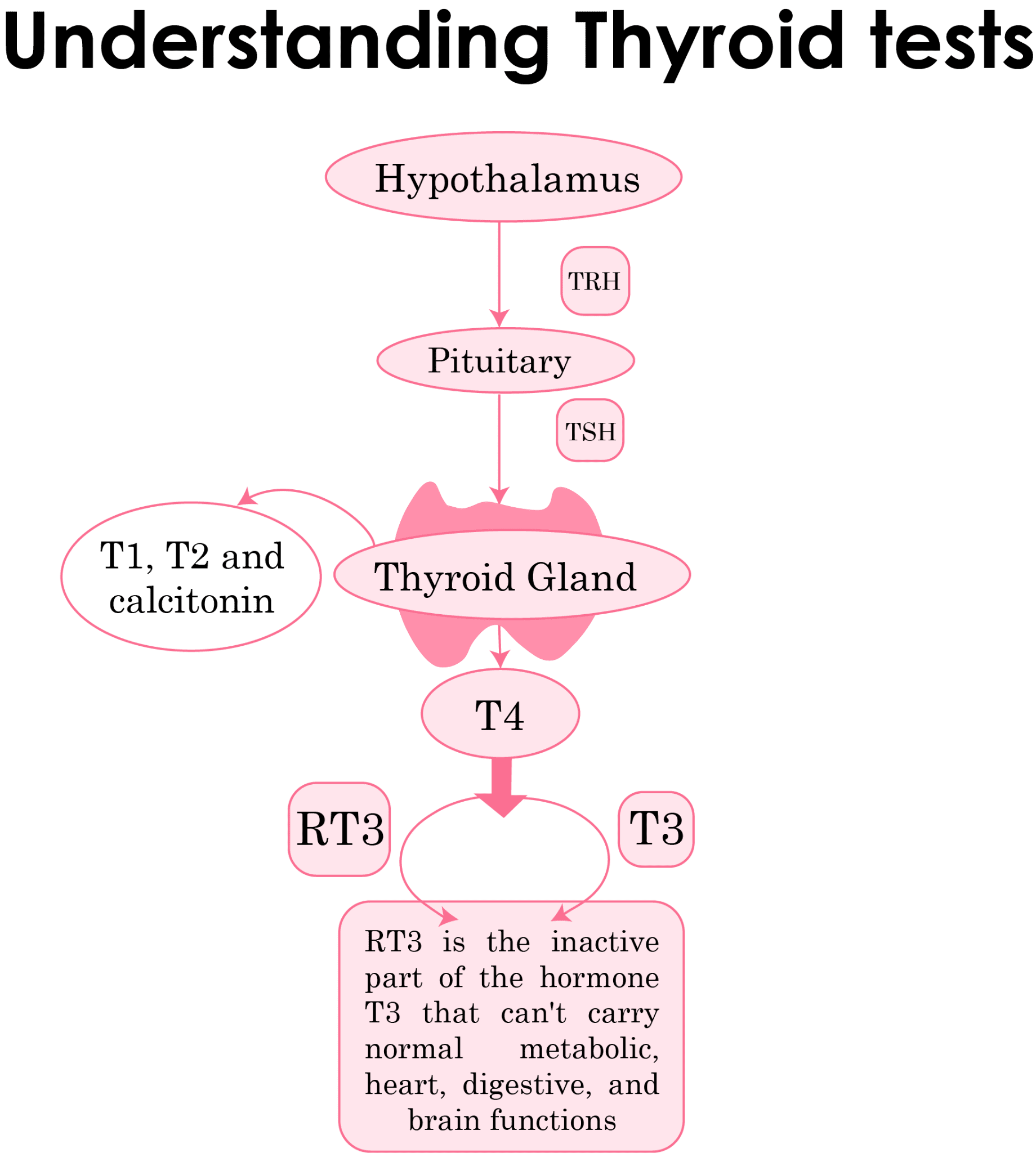
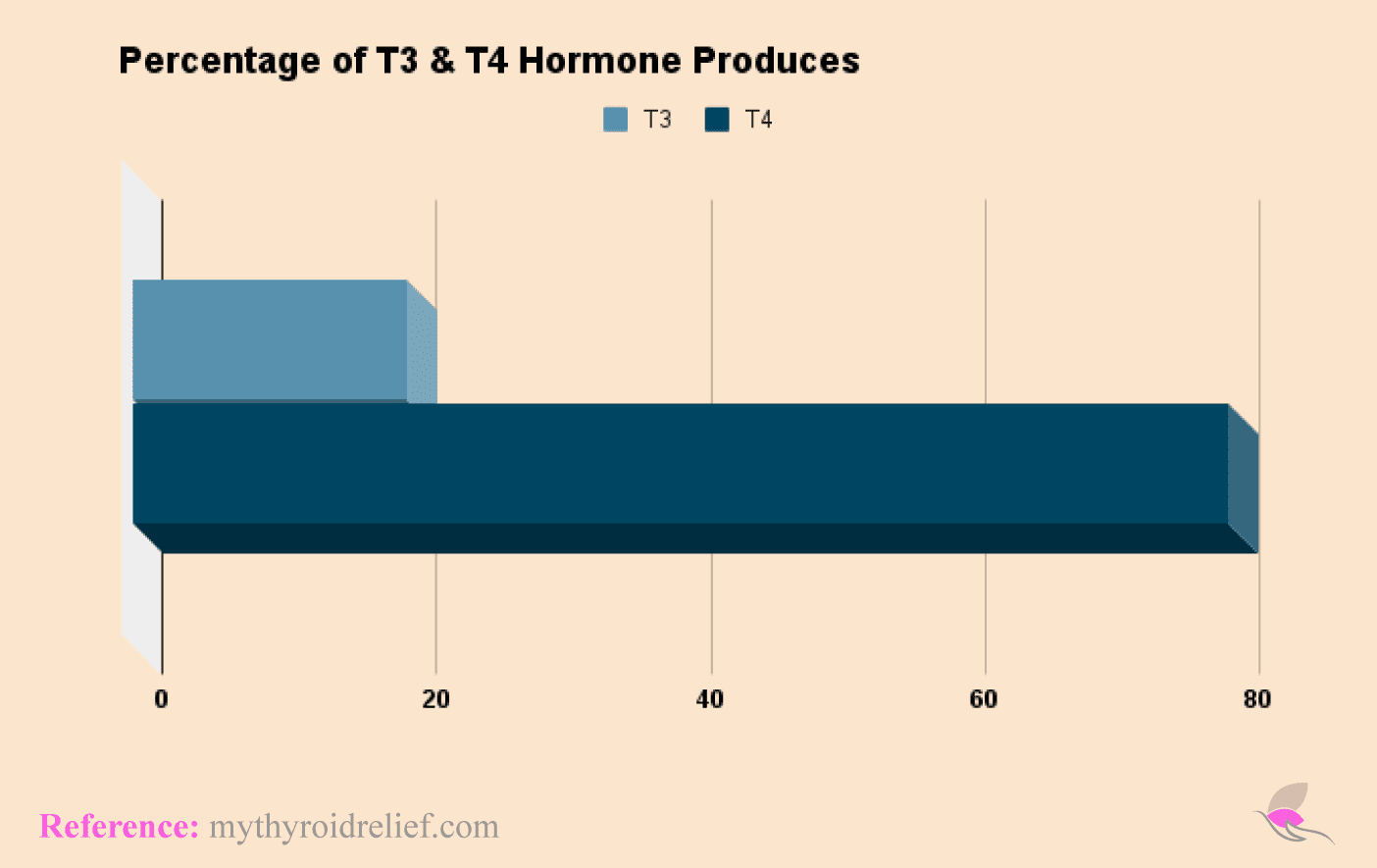
It’s important to know that T3 is about 4 times more active than T4 in terms of metabolic activity, and some experts consider T3 the only active form of thyroid hormone. T4 is generally considered a storage hormone and gets converted to T3 in the peripheral tissues.
Different tissues that rely on T3 to regulate energy usage and metabolism use different enzymes to convert T4 into T3. At the level of the tissues, there can be further adjustments and modifications to this conversion process that can further regulate thyroid hormone homeostasis.
In addition, T4 is also converted into reverseT3 (or rT3). As the name suggests, rT3 inactivates T3 and acts as a biological braking system so the body does not generate too much T3. This conversion is dependent on selenium.
Under normal circumstances, tissues produce rT3 in low amounts, however, in certain medical conditions (cancer, starvation, heart disease, and chronic inflammation), rT3 is produced in greater amounts.
This situation can create an unusual situation where some thyroid labs values may indicate a normal thyroid state, yet clinically, a person may be hypothyroid. This is called euthyroid sick syndrome.
When hypothyroidism is discovered, the first-line medication treatment is the administration of T4. However, as can be seen with euthyroid sick syndrome, T4 is not helpful, as this issue isn’t necessarily caused by low circulating thyroid hormone.
Other Hormones Involved in Weight Problems
- Leptin– this hormone is produced in the fat cells and is thought to travel to the brain to signal if there is an energy deficiency.
If sugar is used as a fuel source, leptin is secreted and helps bring the sensation of satiation or fullness. A high-fat meal, therefore, will not induce an increase in leptin. However, in times of fasting, leptin levels drop, and this induces hunger and decreases energy expenditure.
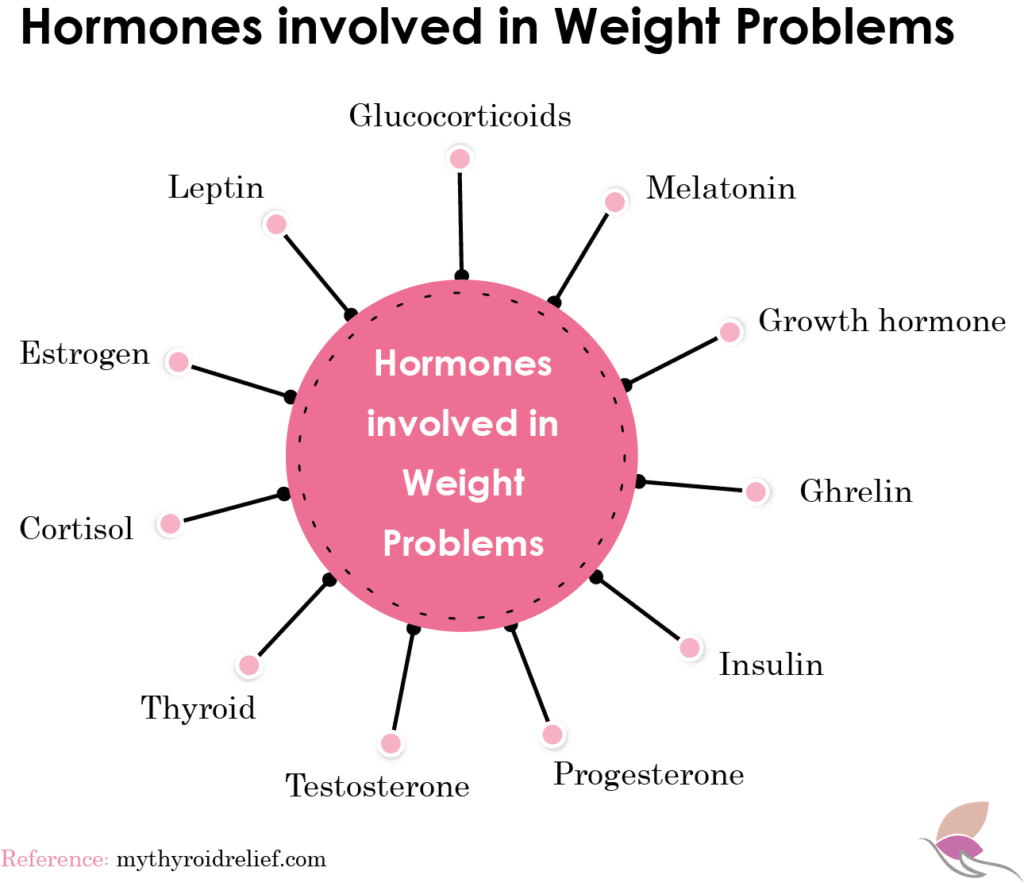
-
Ghrelin– known as the hunger hormone. It is produced mainly by the stomach but can be produced in other tissues (intestine, pancreas, and adrenals).Ghrelin seems to function as a meal-initiation system and acts at the level of the brain, meaning it induces the feeling of hunger.
Insulin Resistance and Weight Gain
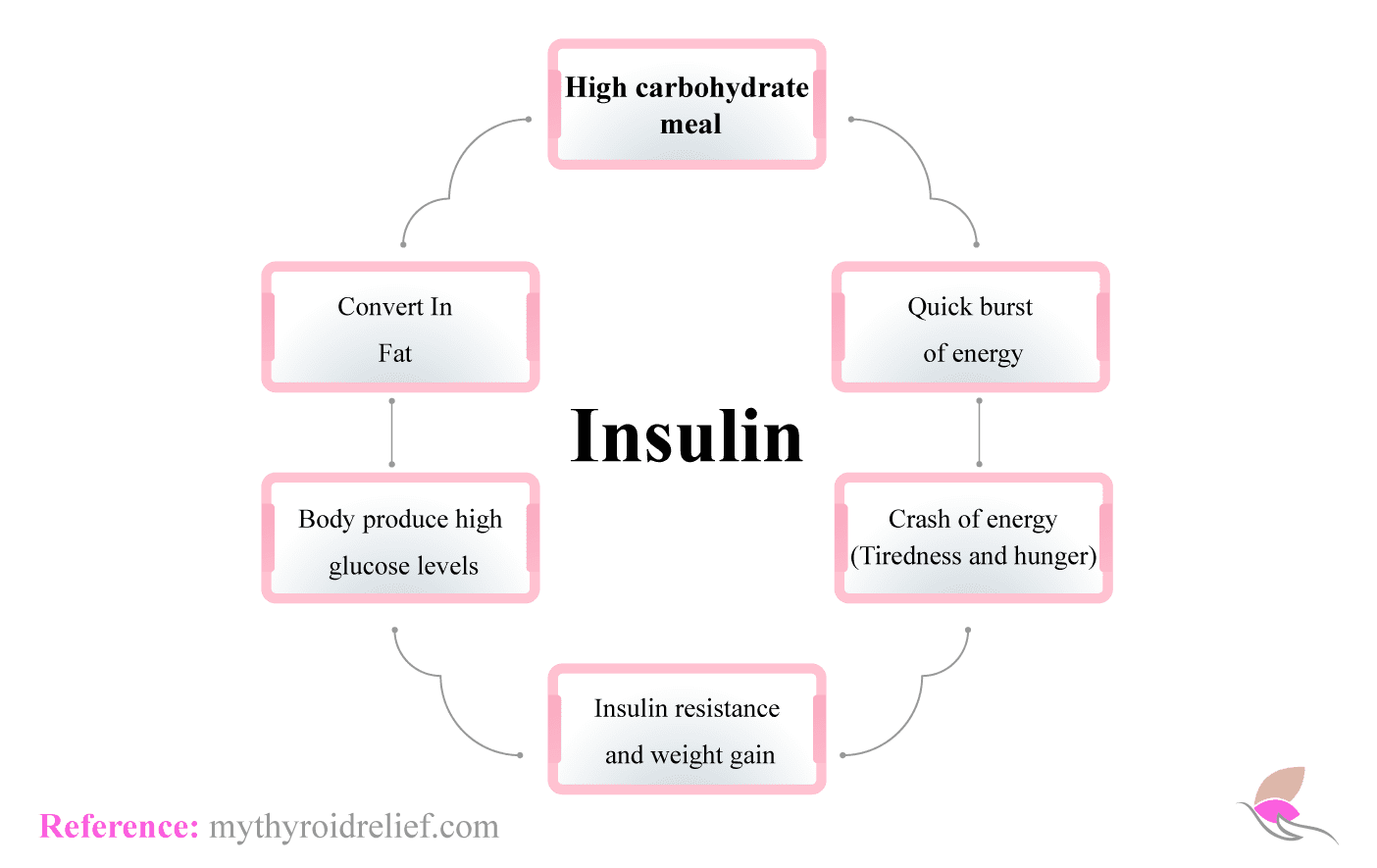
- Progesterone– an important hormone for reproductive function in women. Studies have shown that progesterone can have an effect at the level of the thyroid to help induce the production of thyroid hormones.Progesterone can induce thyroid hormone production without a rise of TSH, Other studies have shown that progesterone administration in women can increase T4. It is, however, unclear how this interaction affects overall thyroid health.
- Estrogen – too little or too much estrogen also impacts the thyroid. Estrogen receptors have been found within thyroid tissue. This indicates that circulating estrogen in the blood can bind these receptors in the thyroid and create specific actions.What seems to occur when estrogen stimulates the thyroid gland is the induction of thyroid tissue growth. However, this does not necessarily lead to hyperthyroidism.
- Testosterone – low testosterone levels are also related to low levels of thyroid hormones in men and women. This occurs due to lower sex hormone-binding globulin (SHBG) amounts.Conversely, in hyperthyroid states, SHBG levels increase. This can lead to a rise in both estrogen and testosterone.
- Cortisol – the body’s stress hormone is affected by thyroid levels. Cortisol is released by the pituitary to help our bodies deal with stress.Research has shown that hypothyroidism seems to lower the normal cortisol recycling mechanism in peripheral tissues. Hypothyroidism also blunts the normal feedback mechanism at the level of the brain.
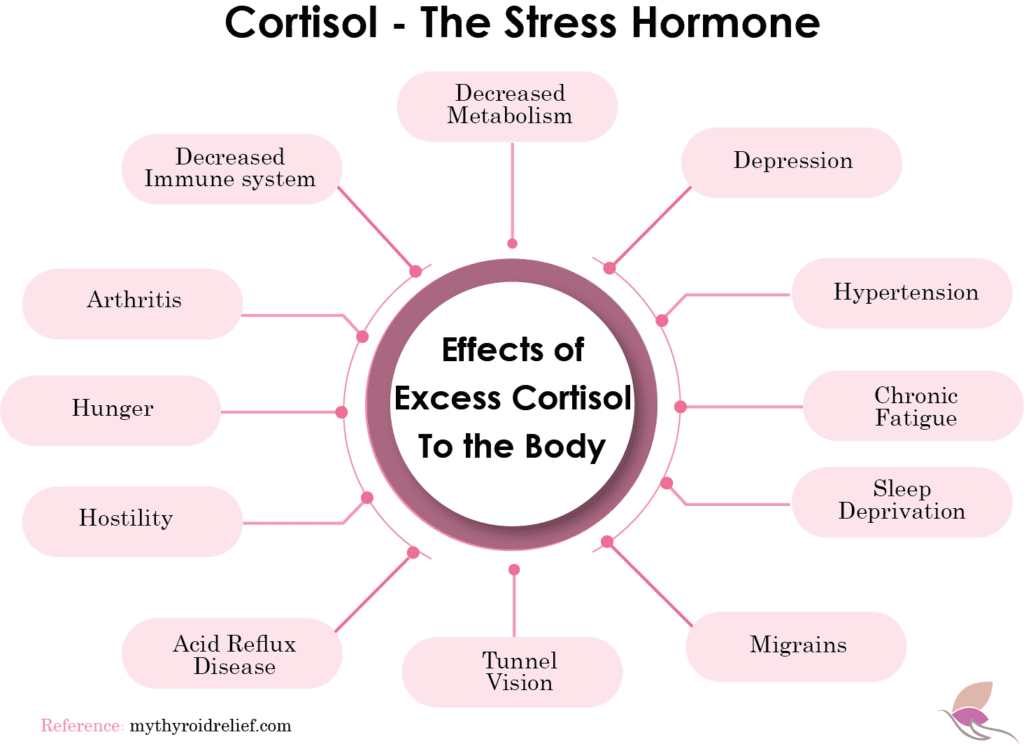
Whether this occurs due to disruptions between the normal communication between the pituitary and thyroid, or if hypothyroidism itself creates a pro-inflammatory state, thus causing cortisol release, is still under investigation.
Tests

- Complete thyroid panel – this is the basic test most doctors begin with. It measures TSH levels and free T4 and T3 levels (remember-much of the thyroid hormones are bound to TBG). In typical hypothyroidism, TSH levels will be elevated and T4 and/or T3 will be low.
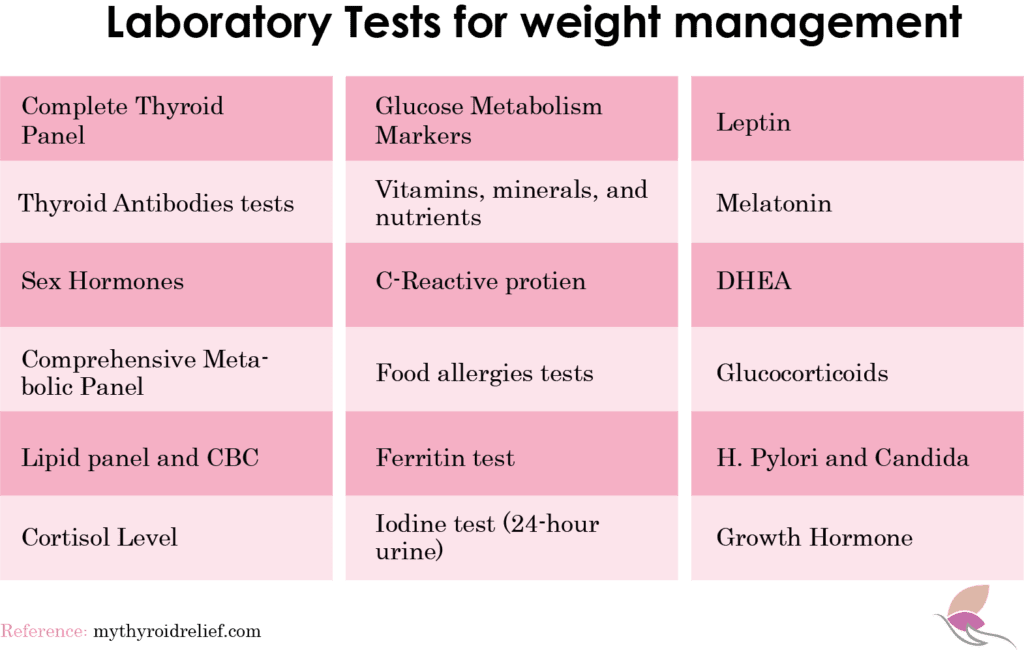
- Thyroid antibody tests – these tests can identify if there is an autoimmune component to a thyroid disorder. The presence of thyroid peroxidase antibodies or high levels of thyroglobulin antibodies may be indicative of Hashimoto thyroiditis, an auto-immune disease that has symptoms like hypothyroidism.
- Sex hormones: tests including DHEA, and Pregnenolone – Sex hormone abnormalities can often occur with other hormonal imbalances, particularly thyroid abnormalities. As mentioned, both hypo and hyperthyroidism can cause low testosterone levels.
Complete blood count (CBC) – this is a basic blood panel that measures the number of different cells found in the blood. The CBC can show if there is a concomitant anemic condition with low hemoglobin levels.
This can account for a feeling of lethargy. The CBC can also suggest if there is an ongoing infection that would raise the white blood cell count.
- Comprehensive Metabolic Panel– this test will measure a variety of components, from liver and kidney function to basic electrolyte levels. Some panels might include a magnesium level which is a mineral commonly deficient in many individuals.
- Lipid panel – a series of lab tests that typically show levels of total cholesterol, the LDL again cortisol is the hormone released in response to stress. Evaluating morning non-fasted cortisol levels can give a general idea of an individual’s stress level. If you have elevated cortisol levels, it may be an indication that your body is reacting to stress.
- Cortisol level – However, the test is relatively non-specific, meaning that cortisol will rise in response to any stressful stimulus, including emotional and/or physiologic stress.Additionally, cortisol levels normally fluctuate during the day and may have different levels at the same time on a different day. Given these variables, it is best to interpret this lab result in a broad sense.
- Glucose metabolism markers– these lab values can be useful in determining the presence of insulin resistance. Insulin and glucose blood levels are often tested together in a fasted state.Elevated fasting insulin levels along with mild elevations of fasted glucose levels can indicate insulin sensitivity. Elevated ferritin levels are also associated with insulin resistance.Finally, checking a Hemoglobin A1C can show an individual’s average blood sugar level over a 3-month period. This will be elevated if there are chronic, long-standing elevations in blood sugar, and can even be diagnostic for prediabetes and diabetes.
- Other helpful lab tests – micronutrient panels that include 25 hydroxy Vitamin D levels are helpful in detecting specific nutrient deficiencies. Vitamin D has many important functions in the body, including maintaining a normal balance of calcium and phosphate and maintaining normal GI and immune function.
- C-Reactive Protein – an acute phase reactant. This test will be elevated in response to inflammation. It is non-specific, meaning it will not give any clues as to where inflammation is occurring. It can give clues to an individual’s overall inflammatory state.
- Food allergies tests – you are at greater risk of developing food allergies if you have an auto-immune condition like Hashimoto’s thyroiditis or Grave’s disease.An underactive or overactive thyroid gland can also have an impact on food allergies, and you may find it difficult to lose weight if you do not know the root cause of the problem.
- Iodine test – a lack of iodine in the diet is associated with hypothyroidism and an enlarged goiter. Typically, iodine is added to many foods and is available from food sources in a balanced diet.
Outside of thyroid issues, an important next step is to undergo an honest intake of your overall stress level. Are there factors either in your psychological or physiological life that are causing chronic stress? What is the fat distribution in your body? What are your ultimate health and physical goals?
If you identify with a pro-inflammatory state in some way, then some of these lab tests might be useful. If you are curious as to your insulin resistance, the glucose metabolism labs can be very useful.
Lab tests can serve as adjunctive data in your weight loss journey, but in many cases, carrying excess weight is often the result of an endocrine abnormality.
Thyroid Medicines
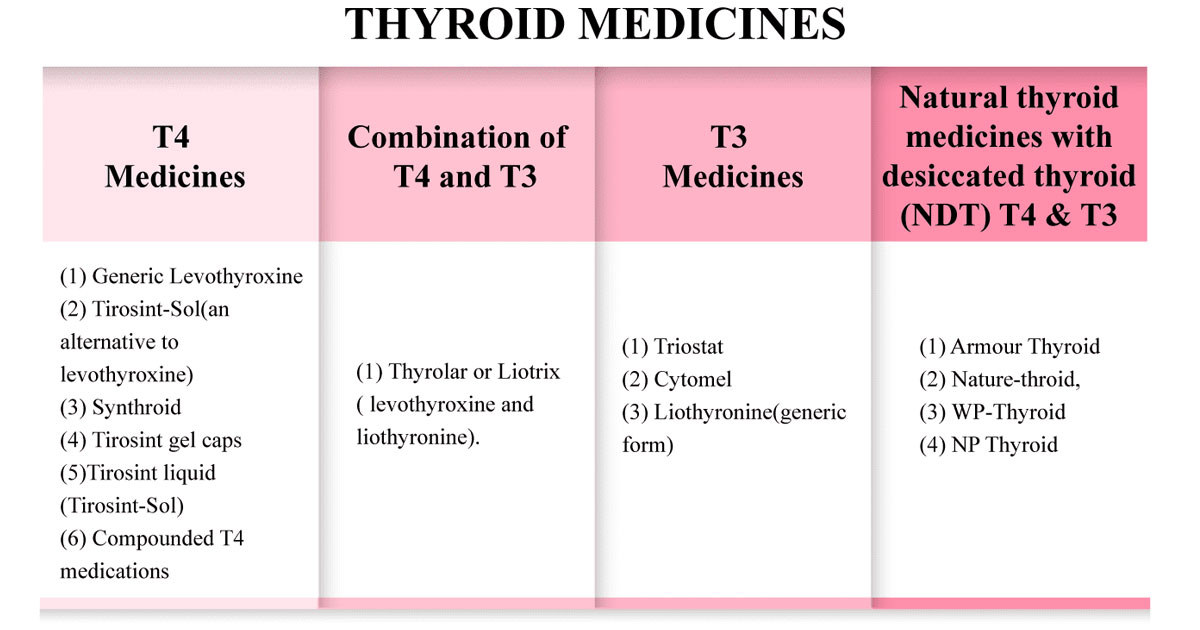
- Naturally desiccated thyroid or NDT is derived from pigs and called porcine thyroid. It is available by the names Armour Thyroid or Nature-thyroid.
- Thyrolar or Liotrix , another combination preparation, contains different ratios of T4 and T3, but it has more T3 than the body normally makes.
Supplements that Help you Lose Weight
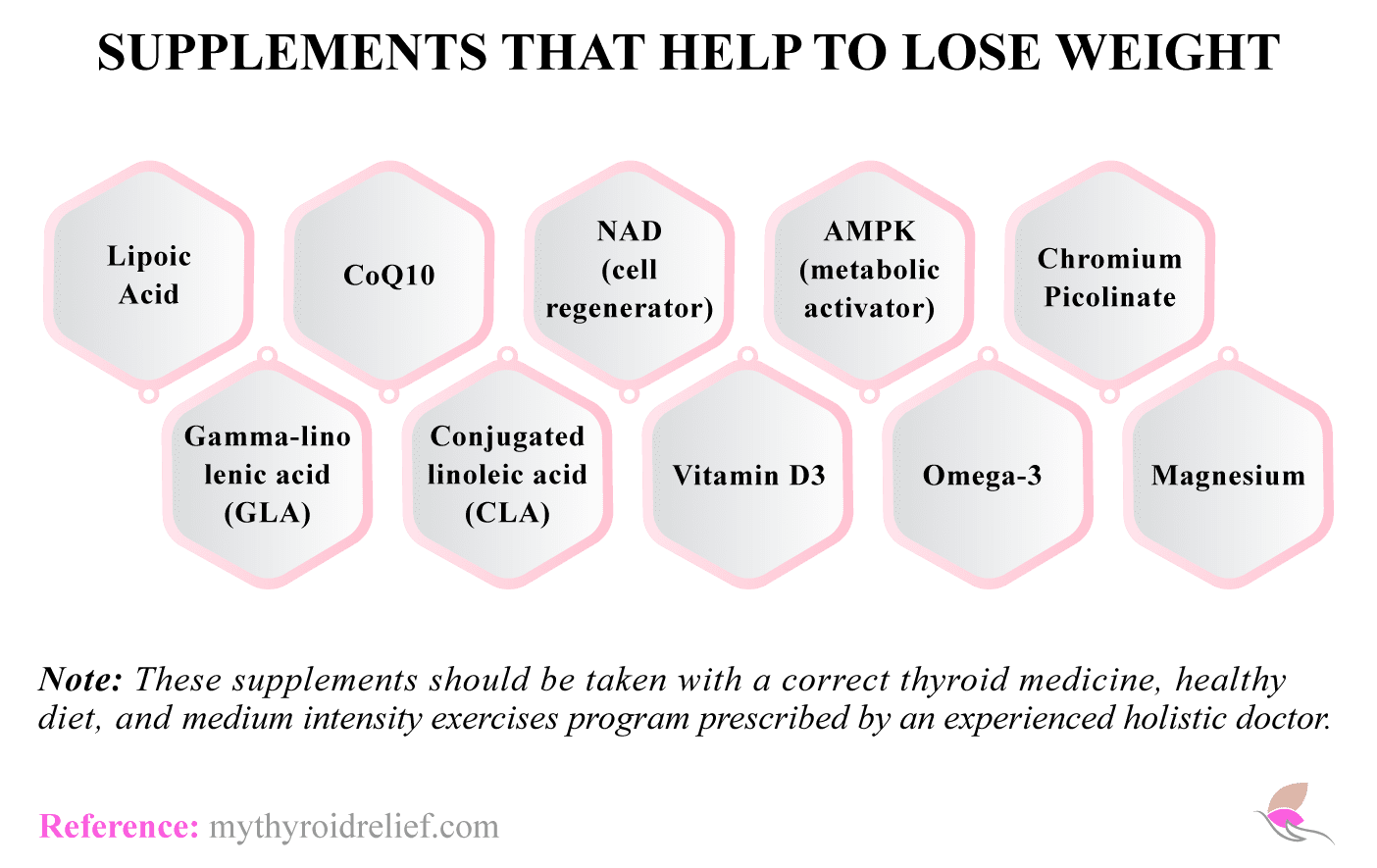
- Lipoic acid – known as Alpha Lipoic Acid or ALA, this is an antioxidant and helps with weight loss.
- CoQ10 – this enzyme may help increase metabolism, helping you lose weight. When you are taking thyroid medicines, check with your doctor before taking CoQ10.
- NAD (cell regenerator) – this supplement improves metabolism and reduces fatigue, both of which may be present with hypothyroidism.
- AMPK (metabolic activator)– this natural supplement fires up the metabolism and is particularly useful in burning abdominal fat.
- Chromium Picolinate – another supplement that helps with weight loss. You can take this up to 1,000 μg/day for weight loss. Chromium reduces insulin resistance in the body and so helps with weight loss. However, if you are on synthetic thyroxine, check with your doctor if it is right for you or not.
- Gamma-linolenic acid (GLA) – commonly known as evening primrose, this natural remedy may help improve weight loss in obese patients.
- Conjugated linoleic acid (CLA) – this not only promotes weight loss but also shrinks fat cells. Apart from being available as a supplement, it is also naturally found in grass-fed beef and dairy products.
- Vitamin D3 – often overlooked, low Vitamin D3 levels occur in more than 50% of people and are linked to obesity. If you do not get enough sunlight for any reason, you should take a Vitamin D3 supplement.
- Omega-3– this is an important antioxidant and may help decrease body weight.
- Magnesium – this nutrient helps boost metabolism and reduce weight.
Also, determine how long to take a supplement to help you achieve your specific health goal. A little discrimination towards what we consume, particularly with supplements, can go a long way.
We’ve seen how endocrine abnormalities, particularly hypothyroidism, can contribute to weight gain. Identifying these abnormalities through lab tests, correcting the deficiencies with medications, and using the correct supplements will together help you lose weight. Let’s move on and look at diet and exercise.
Diet and Exercise

Once you get a sense of what and how much food you’re eating, the next step is to see what all this means from an energetic level. The idea is to break down the macronutrient content of your food and determine how many calories you’re consuming.
Often this is as easy as looking at the label. How many grams of fat, carbs, and protein are in that bar you’re eating, and what are the calories? Add this to your food journal.
If you are making your own food (which is better than eating packaged food), try using MyPlate or MyFitnessPal. These are great apps that can help you determine how many grams of fat and carbs are in that pasta primavera you just made.
Following this, then start setting specific goals. Try to limit the total calories consumed. This will all depend on your height and activity level, but if you notice during your journaling that you’re consuming over 3000 calories a day, try to bring that down to say 2500 calories per day.
Another strategy is to try to limit total carbs consumed to 200g or even less if you’re motivated. Remember, if you limit one macronutrient and you want to keep total calories the same, then you need to eat more of another macronutrient.
Keep in mind that digesting protein requires more energy to do so. Every function in our body has an energy cost, and if you’re eating more protein in your diet than carbs or fat, then you’re expending more energy, and this can help lose weight.
Low-carb diets are very popular and can be extremely effective for some people. Instituting a low-carb diet includes setting a daily limit to carb consumption, usually below 100 g, and making dietary choices that emphasize protein and fats.
Again, having a dietary journal can be useful in instituting and maintaining a low-carb diet.
If you don’t want to be so dogmatic and strict with your eating, often following general guidelines can be more useful in these circumstances.
Following a Mediterranean diet is one way of making conscious dietary choices without being so strict and organized that comes with food journaling.
The Mediterranean diet aims to resemble the cuisine of Greece and Italy. It emphasizes whole foods, vegetables, fish, and other seafood, and uses mostly olive oil for fat. It usually results in lower carbohydrate consumption, and for some people can bring good weight reduction results.
Another general dietary strategy is the Atkins diet. It is widely popular and has its own protocols to follow. The general idea is to limit carb intake without necessarily counting calories. There are specific foods to avoid as a rule. These include added sugar, grains, vegetable oils, and legumes.
Diets like Atkins tend to bring someone into a state called ketosis. This is different from diabetic ketoacidosis, which can be a life-threatening situation.
Ketone bodies travel through the blood and provide a very efficient energy source to organs like the brain. Since the body is using ketone bodies as fuel, lean body mass (muscle mass) can be maintained and therefore metabolism is not adversely affected.
Low carb diets also have the effect of keeping blood insulin levels low. We described insulin as the storage hormone of the body. When insulin levels are high, the body tends not to use fat as fuel, and therefore fat is not lost and body weight increases.
Low carb diets, through the creation of ketone bodies, therefore, keep insulin levels low, promote fat utilization, and this can contribute to weight loss.
There are many other general dietary strategies that are more extreme but can help with weight loss. Diet, in general, is a personal experience and often can bring strong beliefs. The purpose of this article is not to necessarily promote one diet over another.
Everyone’s biology is different, and as such, there’s not one ideal dietary strategy that’s meant for everyone. That said, on one end of the dietary spectrum is veganism. It’s the polar opposite, from the plant perspective, is a carnivore diet.
Both can probably help people lose weight, but again, there’s so much controversy around both diets, and proponents of each tend to be extremely dogmatic.
Whether that plan is food journaling and following a particular macronutrient guideline, or a plan based on a broader dietary strategy, having a detailed dietary blueprint will be critical in difficult, stressful times, because, in response to stress, we often make poor food choices.
Additionally, having specific rules on what you do and do not eat, makes shopping for groceries a bit easier. Being more conscious and connected to our food can equate to a better, healthier lifestyle and thus, a healthier weight and body composition.
A conversation about weight loss is not complete without a discussion on exercise. If you lead a sedentary lifestyle and do not get enough movement in your day, your health can be adversely affected.
Everyone can find 30 minutes sometime in your day. If your day includes scrolling through social media, why not set the phone down and instead spend this time with some physical activity? Try for at least 30 minutes of physical activity, 5 times a week.
If you cannot go to a gym, there are many other things you can try– walking, jogging, swimming, sports or even exercise at home. Exercise helps by burning calories, keeping your body fit, improving muscle tone, and reducing bone loss. It also lowers stress and even releases endorphins which make you feel better.

It reduces blood sugar levels and improves blood pressure. If you walk somewhat faster (don’t just stroll) the beneficial low blood sugar effects may last up to 24 hours.
If you are more motivated, there are hundreds of specific exercise regimens out there. Yoga is an example of patterned movements that can promote weight loss.
At a minimum, yoga can promote stress reduction, and as mentioned previously, weight gain is often the result of an endocrine abnormality. Yoga or Pilates can help normalize your hormones and contribute to a healthy weight.
More intensive forms of physical activity include intermittent high-intensity training (HIT). The idea behind this type of exercise is that you perform a very strenuous movement for a short interval, then rest for a set amount, followed by another round of intense movement.
This type of exercise rapidly increases your heart rate and can bring about dramatic improvements in your cardiovascular performance.
The quintessential HIT protocol is the Tabata interval (aptly named after the famed Japanese scientist Izumi Tabata who originally researched this topic in professional cyclists).
The Tabata protocol involves 20 seconds of intense physical activity, followed by a 10-second break, which is then immediately repeated by another 20-second interval of intense activity. This is repeated for a total of 8 rounds, so the entire workout is only 4 minutes.
This can be done with any intense activity (jumping jacks, sprinting, burpees, etc).
If you’re more interested in the benefits of moderate-intensity exercise, research has shown that targeting a moderate intensity threshold during exercise can have optimal effects on thyroid hormones.
More importantly, this study suggests that increasing exercise over optimal intensity level can adversely affect thyroid hormone levels.

By targeting an exercise intensity of 70% of your maximal heart rate, this study suggests that thyroid hormone levels are optimally elevated, while increasing intensity beyond 70% of maximal heart rate may specifically decrease T3 and free T4 levels.
As with most topics detailing hormone function in humans, there is still much research to be done. But what seems to be a common theme in much of the scientific literature is that exercise is good in moderation, but extremely intensive and prolonged bouts of physical exertion can have adverse effects on your hormonal balance.
It’s always important to find the right balance for your body.As with any exercise program, consult your physician or health practitioner prior to beginning a specific regimen.
Intermittent Fasting
Intermittent fasting is a healthier way of eating. Everyone fasts during their lifetime. When you go to sleep, you enter a fasting state, and in this state, your body activates some of its regenerative functions. This includes recycling of degraded proteins, which may be a contributing factor to longevity.
For intermittent fasting, the idea is to purposely extend this fasting time frame and create a smaller eating window, all while keeping caloric intake the same. Many kinds of intermittent fasting schedules can be followed, and you can follow the timings that suit your lifestyle.
Ideally, you should work up to 16 hours without food and 8 hours during which you can eat. However, you can do this gradually, starting with 12 hours of fasting and 12 hours of eating, but make sure you don’t get up in the middle of the night to snack.
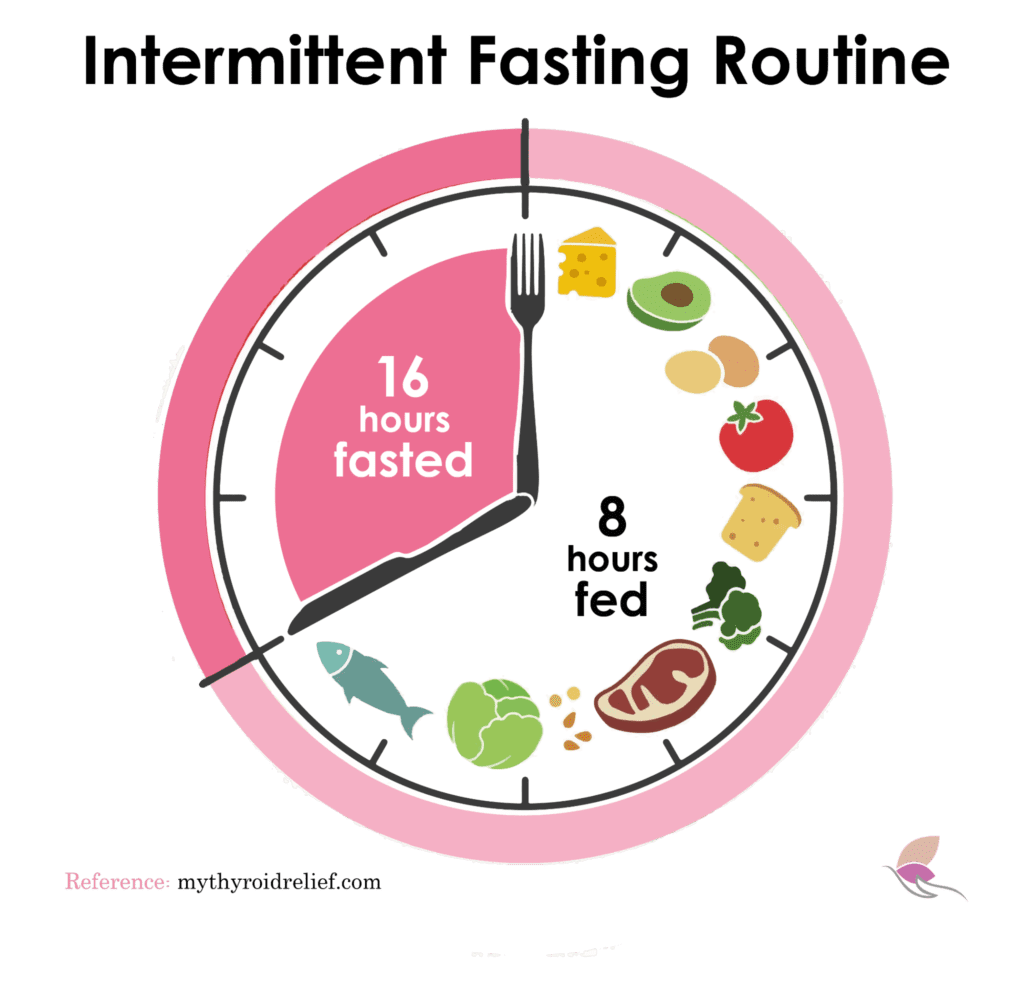
As you gradually increase the fasting window, you will find it easier to work up to 16:8. This means skipping breakfast and finishing eating dinner by 8 pm For example if your dinner was at 8pm and you don’t eat anything until the next day by 12pm, you have been fasting for 16 hours.
Intermittent fasting allows you to drop weight faster. It is a good thyroid weight loss diet. When you have hypothyroidism with weight gain, you should use all the weapons in your arsenal to lose weight.
Before you go on any kind of weight loss diet, it is best to check with a doctor and get guidance as to which method of weight loss program will be right for you.
Sleep and Rest
Maintaining a healthy circadian rhythm is important for all your health functions, but it plays a particularly important role in weight loss.
Our circadian rhythm is how our body naturally reacts to the day/night and wake/sleep cycles, particularly regulating different functions and actions during each cycle.
Our bodies need sleep and recovery for optimal health. Studies have shown that shift work, which disrupts our normal circadian rhythm, is associated with an increased risk of many health concerns, including obesity and diabetes.
One effective method to help maintain a normal circadian rhythm is to sleep earlier. Even if you need to wake up early for work, kids, school, or other life factors, you’re sure to get enough sleep to optimize your health.

While artificial light enables you to do whatever you want during the night, the constant exposure to artificial blue light, notably found in computers, television, and phone screens, all disrupt sleep.
It is Important to sleep in a dark room (without any light from devices, radios, television, and other gadgets.
In fact, even the tiny indicator light, that signals that your device is ready to use or indicates that you have a message, can be disruptive. It is best to turn off all devices completely, unplugging them.
Turn your mobile phone off or keep it in another room. Sleeping with a light on has even been linked to obesity and disruption of the circadian rhythm.

The body begins to produce a hormone after sunset called melatonin, which promotes sleep. If we are exposed to light, blue light, in particular, melatonin production decreases, and we, therefore, cannot sleep.
While you can take melatonin supplements if advised (for the short-term), it is best to listen to your body and not unnecessarily stay awake at night, just because you can. When you sleep early, you wake up early and can enjoy the sunlight.Importance of Outdoors and Sunlight

Conclusion
A healthy body has a wonderful natural mechanism that keeps hormones in the right amount and in balance. If one thing goes out of whack, your health is adversely impacted. Inadequate thyroid hormone levels can cause several health problems, including weight gain and even obesity.
The thyroid hormones are known as the master metabolic regulator, and it’s important to consider that thyroid hormone abnormalities often contribute to other hormone derangements, like low testosterone and elevated cortisol levels.
Keep in mind, if you are struggling to lose weight, remember your thyroid health and take appropriate action.
Talk to your doctor about ordering blood tests, or if you have obtained lab work on your own, seek out a trusted professional to help you interpret the results.
If it turns out that you do have a thyroid problem, talk to a professional about hormone replacement therapy and start instituting other lifestyle changes that can help optimize your health.
Find a dietary strategy that fits your goals and commit to making it a part of your life. Start using exercise to improve your health and metabolism; you can begin with something as simple as 30 minutes of walking a day.
Of course, with a little research, you can find a specific exercise program or regimen that you enjoy and that fits your specific needs.
Talk with a trusted health professional for specific advice if needed. Consider taking supplements to help support your weight loss goals. And lastly, remember to take steps to reduce stress, spend time outdoors in the sunlight, and get plenty of sleep to help your body recover.
Obesity can be very challenging to reverse, especially when it’s caused by an endocrine problem like hypothyroidism. You have arrived at this article for a reason, and it’s likely because you are taking control of your health and educating yourself on how to improve your wellbeing.
No matter where you are on your journey to better health, remember to enjoy the process and stay positive. By sticking with these principles and committing to a comprehensive, holistic approach, it’s possible to achieve your weight goals even in the setting of hypothyroidism.
References
- Obradovic M, Sudar-Milovanovic E, Soskic S, Essack M, Arya S, Stewart AJ, Gojobori T, Isenovic ER. Leptin and Obesity: Role and Clinical Implication. Front Endocrinol (Lausanne). 2021 May 18;12:585887. doi: 10.3389/fendo.2021.585887. PMID: 34084149; PMCID: PMC8167040.
- Klok MD, Jakobsdottir S, Drent ML. The role of leptin and ghrelin in the regulation of food intake and body weight in humans: a review. Obes Rev. 2007 Jan;8(1):21-34. doi: 10.1111/j.1467-789X.2006.00270.x. PMID: 17212793.
- Gauthier BR, Sola-García A, Cáliz-Molina MÁ, Lorenzo PI, Cobo-Vuilleumier N, Capilla-González V, Martin-Montalvo A. Thyroid hormones in diabetes, cancer, and aging. Aging Cell. 2020 Nov;19(11):e13260. doi: 10.1111/acel.13260. Epub 2020 Oct 13. PMID: 33048427; PMCID: PMC7681062.
- Bertoni AP, Brum IS, Hillebrand AC, Furlanetto TW. Progesterone Upregulates Gene Expression in Normal Human Thyroid Follicular Cells. Int J Endocrinol. 2015;2015:864852. doi: 10.1155/2015/864852. Epub 2015 May 21. PMID: 26089899; PMCID: PMC4454767.
- Krassas GE, Poppe K, Glinoer D. Thyroid function and human reproductive health. Endocr Rev. 2010 Oct;31(5):702-55. doi: 10.1210/er.2009-0041. Epub 2010 Jun 23. PMID: 20573783.
- https://www.mayoclinic.org/healthy-lifestyle/nutrition-and-healthy-eating/in-depth/mediterranean-diet/art-20047801
- Valsdottir TD, Øvrebø B, Falck TM, Litleskare S, Johansen EI, Henriksen C, Jensen J. Low-Carbohydrate High-Fat Diet and Exercise: Effect of a 10-Week Intervention on Body Composition and CVD Risk Factors in Overweight and Obese Women-A Randomized Controlled Trial. Nutrients. 2020 Dec 30;13(1):110. doi: 10.3390/nu13010110. PMID: 33396889; PMCID: PMC7824646.
- Manninen AH. Metabolic effects of the very-low-carbohydrate diets: misunderstood “villains” of human metabolism. J Int Soc Sports Nutr. 2004 Dec 31;1(2):7-11. doi: 10.1186/1550-2783-1-2-7. PMID: 18500949; PMCID: PMC2129159.
- Sullivan EM, Pennington ER, Green WD, Beck MA, Brown DA, Shaikh SR. Mechanisms by Which Dietary Fatty Acids Regulate Mitochondrial Structure-Function in Health and Disease. Adv Nutr. 2018 May 1;9(3):247-262. doi: 10.1093/advances/nmy007. PMID: 29767698; PMCID: PMC5952932.
- https://thebeet.com/trending-the-vegan-diet-for-weight-loss-bye-bye-keto
- https://en.wikipedia.org/wiki/Izumi_Tabata
- Atakan MM, Li Y, Koşar ŞN, Turnagöl HH, Yan X. Evidence-Based Effects of High-Intensity Interval Training on Exercise Capacity and Health: A Review with Historical Perspective. Int J Environ Res Public Health. 2021 Jul 5;18(13):7201. doi: 10.3390/ijerph18137201. PMID: 34281138; PMCID: PMC8294064.
- Ciloglu F, Peker I, Pehlivan A, Karacabey K, Ilhan N, Saygin O, Ozmerdivenli R. Exercise intensity and its effects on thyroid hormones. Neuro Endocrinol Lett. 2005 Dec;26(6):830-4. Erratum in: Neuro Endocrinol Lett. 2006 Jun;27(3):292. PMID: 16380698.
- Hackney AC, Saeidi A. The thyroid axis, prolactin, and exercise in humans. Curr Opin Endocr Metab Res. 2019 Dec;9:45-50. doi: 10.1016/j.coemr.2019.06.012. Epub 2019 Jul 5. PMID: 31482146; PMCID: PMC6720127.
- Napoleão A, Fernandes L, Miranda C, Marum AP. Effects of Calorie Restriction on Health Span and Insulin Resistance: Classic Calorie Restriction Diet vs. Ketosis-Inducing Diet. Nutrients. 2021 Apr 15;13(4):1302. doi: 10.3390/nu13041302. PMID: 33920973; PMCID: PMC8071299.
- Engin A. Circadian Rhythms in Diet-Induced Obesity. Adv Exp Med Biol. 2017;960:19-52. doi: 10.1007/978-3-319-48382-5_2. PMID: 28585194.
Top site ,.. amazaing post ! Just keep the work on !
Wow Amazing Website
Hi Heriberto,
Thank you for the kind words! We’re delighted that you find our website amazing. Feel free to explore and let us know if there’s anything specific you’d like to see or learn more about on our site. We appreciate your support!
Wow amazing site
Thank you so much for your kind words! We’re thrilled that you find our site amazing. If you have any specific topics or questions you’d like us to cover in our blog, please feel free to let us know. We’re here to provide valuable information and insights to our readers. Happy reading